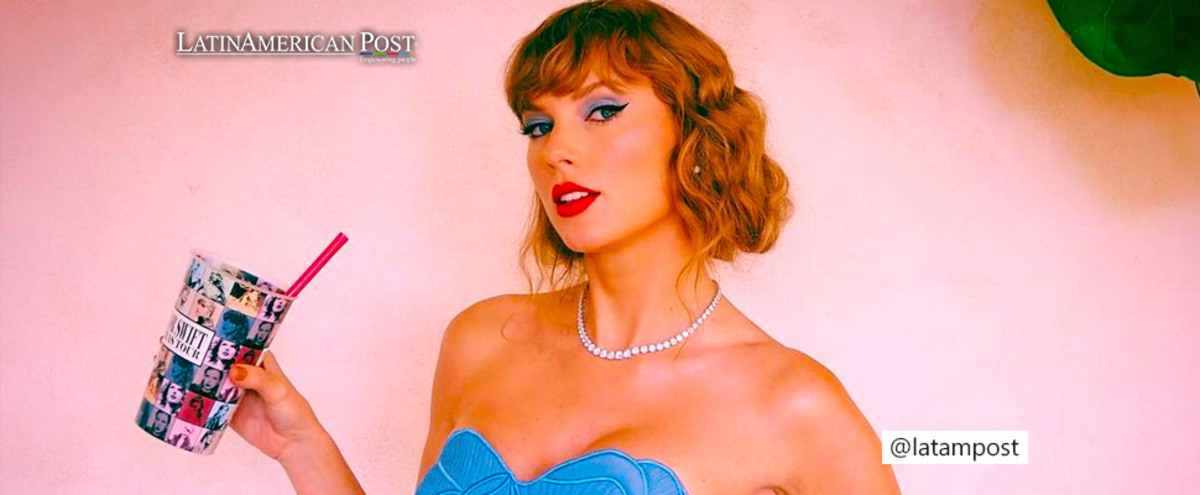As Taylor Swift fans gathered for her Argentine concert debut, political posters sparked debate on the upcoming presidential runoff.

Photo: IG-taylorswift
Latin American Post Staff
Escucha este artículo
Leer en español: Política pop: el concierto de Taylor Swift se enfrenta a la fiebre electoral argentina
The Swiftie Stand
Amid the buzz of Taylor Swift's highly anticipated first concert in Argentina, a unique blend of pop culture and politics greeted the thousands of excited 'Swifties' – a term affectionately used to describe the singer's fans. Just outside the venue, a bold statement on posters caught their eye: "A Swiftie Doesn't Vote Milei," aligning the fandom against Javier Milei, a right-wing populist candidate in Argentina's presidential election.
The synergy of music and political activism is not new, but the backdrop of Argentina's charged political landscape gave these posters a potent significance. The posters, pointedly associating Milei with the divisive politics of figures like Donald Trump, tapped into a global language of political discourse familiar to the Swift fanbase.
Swift, a 12-time Grammy winner known for her empowering lyrics and advocacy for various social issues, has become an unwitting symbol in Argentina's political conversation. Fans like 17-year-old Julieta Bracamontes resonate with the message, seeing a disconnect between Swift's public stances and Milei's conservative agenda, particularly on issues like abortion and LGBTQ+ rights.
Milei's Controversial Platform
The conversation around these posters isn't just a reflection of Swift's global influence but also speaks to the deep political divisions within Argentina. Milei's platform, described as anarcho-capitalist, has stirred controversy with his socially conservative views despite his stated support for marriage equality – a legal reality in Argentina since 2010. His stances against sex education in schools and state support for the trans community, among others, have become focal points in the nation's political dialogue.
As Swifties converged on Buenos Aires' Monumental Stadium, another political poster made its rounds, featuring a stylized image of Swift holding cookies with "Massa 2023" inscribed, alluding to Swift's supposed endorsement of Joe Biden in 2020. This visual nudge pushed fans toward Sergio Massa, the Economy Minister and Milei's opponent in the November 19 runoff.
This unexpected intersection of pop culture and politics in Argentina is not isolated. Late last month, a Swift fan club made headlines by urging fans to vote against Milei, casting him as a threat to democracy and the rights of Argentinians. The statement came after Massa's lead in the October 22 election, where he secured 37% of the votes to Milei's 30% – a margin too small to forego a second-round election.
Yet, not all Swifties appreciated the political overture. Some, like 28-year-old Lucila Losinno, found the fan club's stance presumptive, arguing that political views are personal and should not be broadly ascribed to a fan community. For others, the concert was an escape from the pervasive political tension, a sentiment echoed by 19-year-old Malena Garachena, who was uneasy about melding Swift's artistic image with political campaigning.
The interplay of Swift's concert with Argentine politics is a vivid reminder of how political narratives can infiltrate all spaces, even those meant for entertainment and escapism. It reflects a broader trend where celebrities and their platforms are increasingly leveraged to influence public opinion and political outcomes, a testament to their sway over public discourse.
Also read: The Resonance of Taylor Swift in Mexico's Supreme Court
A Fitting Fusion
Argentina's political history, marked by passionate political activism and intense political and economic upheaval periods, sets a dramatic stage for such a fusion of pop culture and political expression. In a country where the arts have long been a vehicle for political commentary, incorporating a global music icon into the conversation seems almost fitting.
As Argentina stands on the precipice of a crucial electoral decision, the incident at Swift's concert is a microcosm of the more significant dynamics in the nation's democracy. It manifests the citizens' engagement with the political process and their desire to connect global cultural phenomena with local political realities.
In the end, Swift's Argentine concert debut will be remembered not just for the music and performances but also for the political fervor it inadvertently ignited. As the nation dances to the tunes of a global pop star, it also contemplates the future direction of its political journey, illustrating the power of music and celebrity to echo beyond the stage and into the heart of civic debate.




